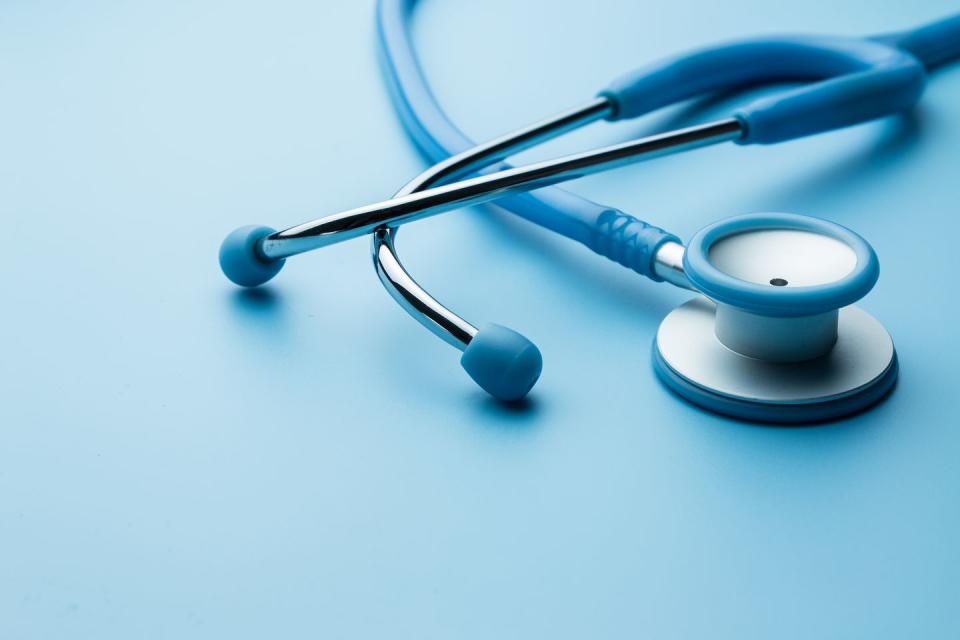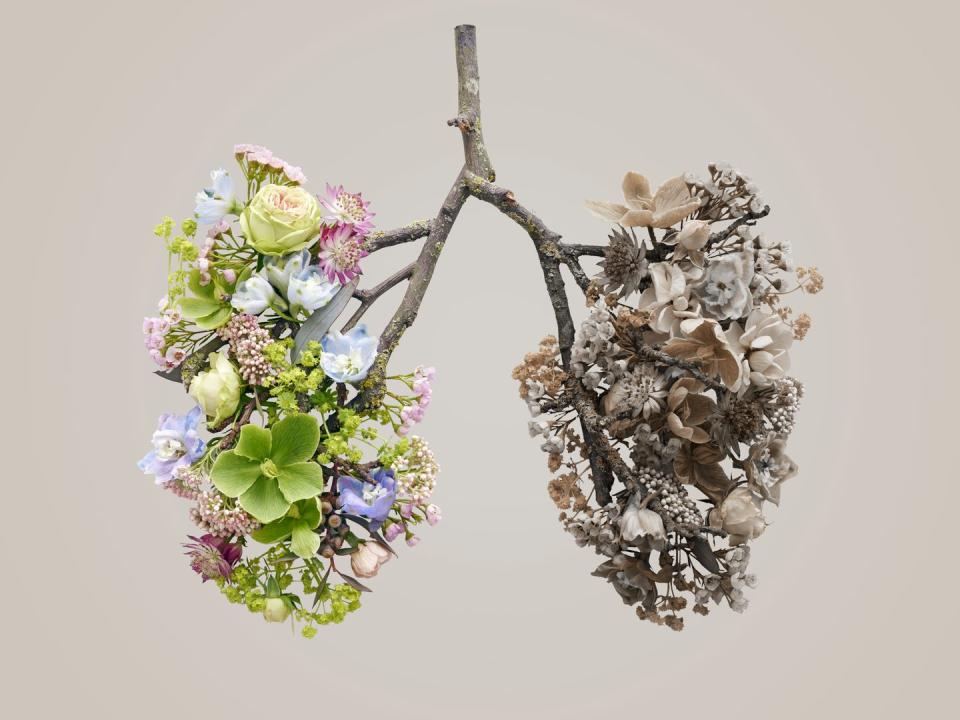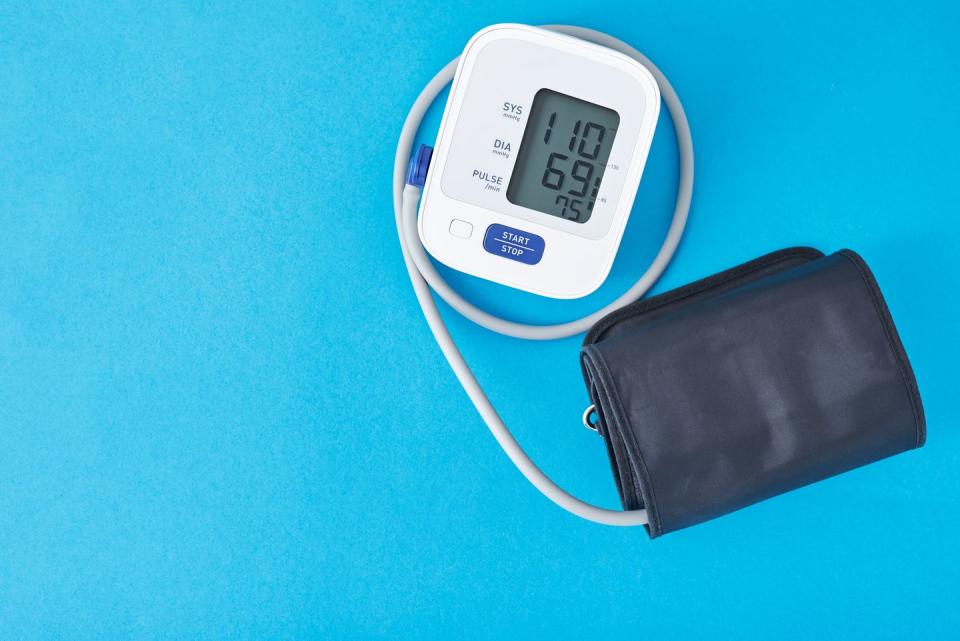5 Health Issues to Look Out For If You Have COPD

If you have chronic obstructive pulmonary disease (COPD)—a chronic lung disease that causes breathing problems—you’ve likely learned to deal with new challenges. According to the Centers for Disease Control and Prevention (CDC), frequent coughing and wheezing, excess phlegm, and shortness of breath are all typical symptoms of this all-too-common disease. Nearly 15.7 million Americans have been diagnosed with COPD, the CDC says.
What’s crucial to know is that having COPD means you’re at an increased risk of other health issues, and ones that may not seem so obvious, like catching a cold or struggling with your mental health. Here, doctors outline five potential problems that should be on your radar, and what you can do to help prevent them.
1. Respiratory infections

People with COPD have an increased risk of developing colds, the flu, pneumonia, and COVID-19. “COPD affects the airways of the lung, which is one of the first defenses against bacterial or viral infections,” says Reynold Panettieri, M.D., director of the Institute for Translational Medicine and Science at Rutgers University. “As a consequence, patients with COPD are going to have a greater susceptibility to infection.”
COPD can also damage structural parts of your lungs and respiratory system, including the cilia (hair-like projections that move germs and debris up and out of your airways). “If that structural immune system is damaged, it decreases your ability to clear infections,” says Destry Washburn, D.O., a pulmonologist with Riverside University Health System.
How to protect yourself
Practice proven methods of preventing respiratory illnesses. “Get your flu vaccine every year, and a pneumonia vaccine if you’re over 65,” says Lavannya Pandit, M.D., a pulmonologist and assistant professor of medicine at the Baylor College of Medicine. She also recommends seeing your doctor regularly to ensure that your COPD is well managed and adding exercise to your weekly routine to improve your lung function.
Following recommendations to help prevent the spread of COVID-19, such as social distancing, wearing a mask, and regularly washing your hands, are also going to help keep you safe from a range of respiratory infections.
2. Heart and vascular problems

There are a couple of reasons you may be at an increased risk for these issues, Dr. Panettieri says. One is that smoking, the main cause of COPD, raises your risk of atherosclerosis, a buildup of fats, cholesterol, and other substances in and on your artery walls, which can restrict blood flow. The buildup can trigger a blood clot that can cause a heart attack or stroke.
Having COPD can also make it difficult to get enough oxygen into your blood, and low blood oxygen makes the heart work more. This can lead to problems like high blood pressure and stroke, Panettieri says.
How to protect yourself
If you have COPD and you smoke, you should stop, Dr. Panettieri says. (These tips and resources can help.) And if you’ve been prescribed oxygen, Dr. Pandit recommends that you actually use it, noting that she’s seen patients shun the treatment because they’re worried about it becoming a crutch. “You’re not going to get addicted to it,” she says. “Take it as directed.”
3. Lung cancer

COPD is a risk factor for developing lung cancer, especially squamous cell carcinoma, a type of cancer found in the cells that line the lungs’ airways. This may be because there are common mechanisms between the two diseases, research indicates, such as premature aging in the lungs and genetic predispositions. What’s more, studies show that people who smoke are up to five times more likely than non-smokers to develop lung cancer.
How to protect yourself
If you have a history of smoking or have other risk factors for lung cancer, like a family connection to the disease, Dr. Panettieri says it’s a good idea to get a CT chest scan to screen for lung cancer. Additionally, the U.S. Preventative Services Task Force recommends annual screenings if you’re currently a heavy smoker or have been within the last 15 years.
There is some evidence that regularly screening people with COPD for lung cancer can help catch the disease early if it develops. So even if you’re not a smoker or don’t have a family history of lung cancer, it might be something to talk over with your doctor.
4. High blood pressure

With COPD, you’re particularly at risk for pulmonary hypertension, or high blood pressure in the arteries to your lungs, Dr. Pandit says. This means the blood vessels that carry blood from your heart to your lungs become hard and narrow. As a result, your heart has to work harder to pump blood, and over time this can weaken the muscle and lead to heart failure.
How to protect yourself
Kicking a smoking habit can help here too, Dr. Panettieri says. “If you can do that, you’ll lessen your risk remarkably,” he says.
Eating a healthy diet and exercising regularly is also beneficial, he says. Both help keep your arteries healthy, and the combo can help you maintain a healthy weight, which lowers your risk of high blood pressure further, Dr. Panettieri says.
5. Mental health issues

This isn’t discussed often with COPD, but it’s important, Dr. Washburn says. “A lot of COPD patients who smoke or smoked beat themselves up because they feel like they’ve given the disease to themselves,” he says. “They have to battle that, along with the physical illness.”
Living with a chronic disease like COPD can also be demoralizing, Dr. Pandit says. “You may be dependent on other people and may not want to be,” she says. Plus, not being able to do the same daily things as before can be frustrating, Dr. Pandit adds.
How to protect yourself
To help you manage, Dr. Washburn recommends reaching out to your support network—family, friends, and others with COPD—and talking about how you feel. If you don’t have a strong support system, be open with your physician, he says. Your doctor may be able to help you talk through what’s happening, or at the least, refer you to a local support group, like the Better Breathers Club, or a virtual one, like Living with COPD Community.
While living with COPD will always be a challenge, sharing with and relating to others can make dealing with the disease easier, Dr. Panettieri says, and help you move forward.
You Might Also Like


